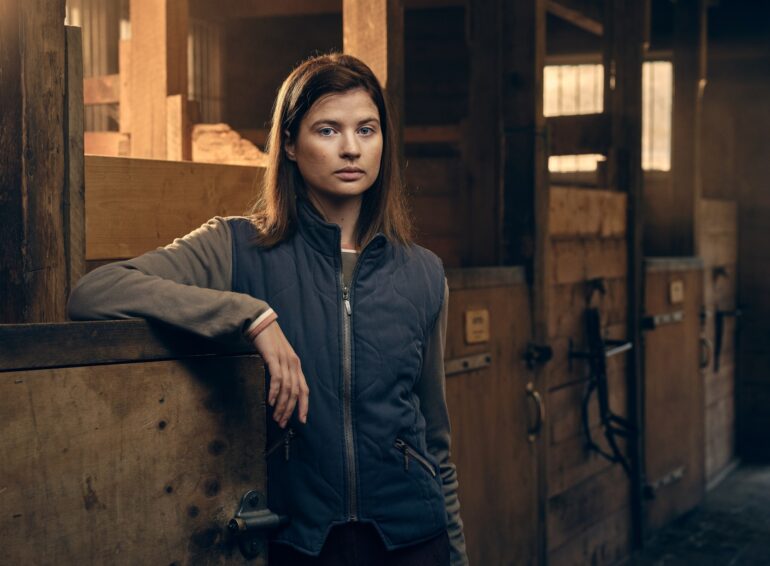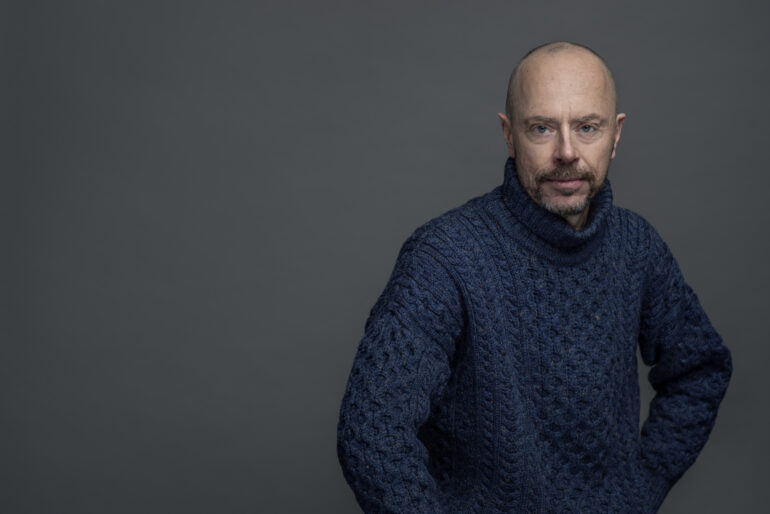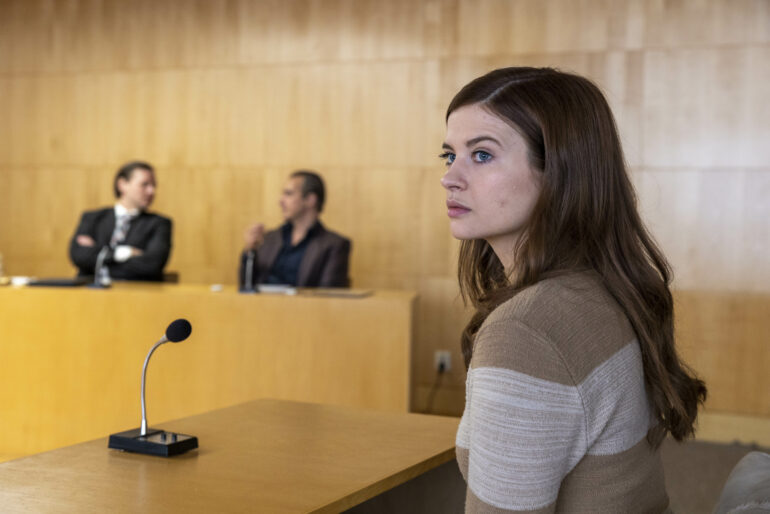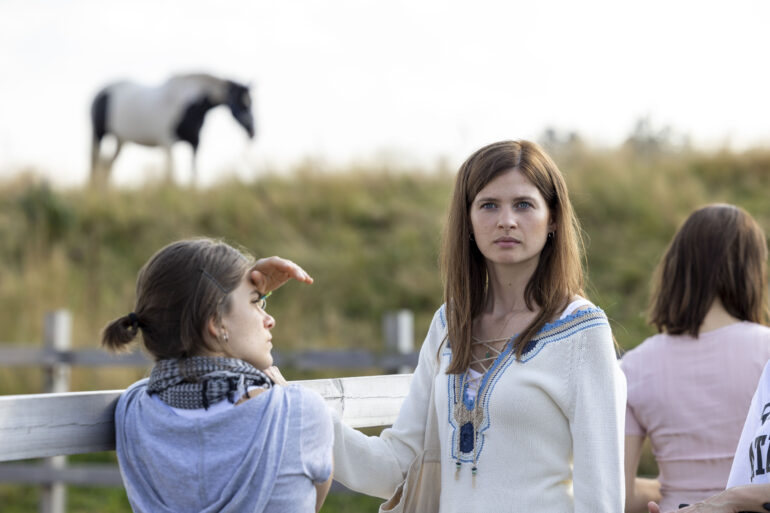WRITTEN BY: Annika Pham
Jarowskij’s crime series inspired by a true story had a successful kickstart on C More October 31st. Wild Bunch is handling world sales on the Swedish show in eight episodes.
Riding in Darkness (Nattryttarna) is a gripping and urgent event series about abuse, loosely based on a true story that occurred at an equestrian centre in Sweden in the 1990s to 2016.
(Watch out for spoilers in this story).
The frame of the series is a strong story of redemption and atonement. The young underprivileged Molly (Saga Samuelsson) leaves her broken family to live and work at the riding school Heddesta in 1996. She befriends the stable girl Frida (Amanda Jansson). At first Molly thinks she has arrived in paradise, but she soon realises that all is not right at the riding school and farm. The manager Tommy (Jonas Karlsson) is charismatic and charming, but also manipulative, with very dark sides. He is predator, committing abuses, both psychological and physical. Soon, Molly's only goal is to get out of Tommy's grasp and to hold him accountable.
The story stretches from the beginning of the 90s to the years 2003-2007, when Tommy's daughter Victoria (Hanna Ardéhn), her little sister Agnes (Tehilla Blad) and his wife Lotta (Malin Persson) all struggle to get out of his violence.
Riding in Darkness was written and created by seasoned showrunner/writer Ulf Kvensler (The Restaurant, Solsidan) in collaboration with music artist Sophie Jahn, daughter of the real riding club manager. The series was produced by Jarowskij’s Emma Nyberg in co-production with Film i Väst and ZDF, in collaboration with FEM, and support from Nordisk Film & TV Fond.
According to C More, Riding in Darkness had a very promising start last night, in line with premieres of the streamer’s biggest successes Gåsmamman and Beck.
Reviews in the Swedish press averaged 4 stars in several outlets (Aftonbladet, Göteborgs-Posten, Kulturnytt P1 Sveriges Radio).
We spoke to Ulf Kvensler and Hanna Ardéhn ahead of the premiere.
When did you board the project and why?
Ulf Kvensler: It all started after Sophie Jahn had watched Quicksand. She told her agent: the father in the show is nothing compared to my real father! The agent then contacted Jarowskij’s CEO Irene Lindblad and said: I have a client with an amazing life story. Would you be interested to perhaps turn it into a movie or a TV show? Irene contacted me and suggested I meet up with Sophie, which I did. This is how I got involved. That was in August 2019.
A very important point is that the true story ends positively. The women triumph, repair their relationships and survive. If we didn’t have this, I don’t think I would have been able to write such a dark story of abuse.
You created the show in collaboration with Sophie Jahn. How did you approach the fiction writing based on the true story? What were the no-go zones and what research did you undertake?
UK: I immediately felt it was an incredible story with twists and turns. I spoke to the real stable girls - called Molly and Frida in the series. Their story was as astounding as Sophie’s story. I felt that I wanted to keep as much as possible of the flow of the real story, the long narrative arc, because if I could make the audience feel just a bit the way I felt when I first heard about the true story, I knew we would have an incredible show.
I still had to compress the number of characters and timeline, as the true story spanned 28 years. In the show, we’ve compressed it into 15 years, which is still a good spread, to give the story its epic quality and to close the narrative arc with the themes of redemption and atonement.
Then of course, we had to dramatise it to distance ourselves from the real people. We’ve changed the names and places, and apart from the near family, there is no one to one relationship between the characters in the show and the people in real life.
I read archive material - articles published at the time, reports from the police investigation and the legal case, and did a lot of interviews, speaking several times to Sophie, her little sister and the stable girls called Molly and Frida in the show.
I had a valuable help from a researcher with whom interviewees sometimes felt more comfortable to speak to.
Having Sophie [Jahn] on board was crucial to convince people to speak to us, although many were still reluctant to do so, plus the police and legal experts didn’t want to be involved.
Do you feel that the women would have had a better legal support, had the scandal of multiple abuse happened today, with #MeToo?
UK: All in all, I feel the legal system treated this case pretty well. The problem was that after the perpetrator was released from jail, SVT did a documentary about the case, suggesting that it was all made up by ‘Molly’ and the stable girls. That kind of exonerated the perpetrator, despite his conviction.
What are your views on the character of Tommy in the series?
UK: Guys like these don’t walk around with a sign saying monster. On the contrary. Many are charming, creative, charismatic, just like Harvey Weinstein, Jean-Claude Arnault [linked to the Nobel literature prize sexual assault scandal] or NXIVM cult leader Keith Raniere in the US. But their attractiveness, combined with their position of power, makes them all the more dangerous.
Was the Netflix show Unbelievable an inspiration?
UK: Many channels/platforms shy away from the very tough subject of sexual abuse and rape. Unbelievable showed that you can make a series on that topic and still reach a broad audience. That was an inspiration. We also decided to use the victims’ perspective for our entire show, which if I remember was one part of the narration in Unbelievable, which makes it for a slightly easier viewing.
What were the biggest challenges in building the arc and plot? Did you write the full show on your own?
UK: Although I’ve written many important shows in a writers’ room (Solsidan, The Restaurant for example), here I wanted to write it all, to have a better control over the whole arc. The biggest challenge was to have a change of focus mid-way through the story. The story shifts from Molly and the abuse at the riding club, to Tommy’s family, how the daughters and mother break free so to speak. It is often delicate to change focus as people sometimes lose interest in the main characters. So we decided to bring in from the start the character of Victoria as an adult to ease the connection.
Was it difficult to write about sexual abuse from the women's perspective?
UK: Not really as I was surrounded by women, from Sophie [Jahn] to the director Molly Hartleb, Irene [Lindblad], my producer Emma Nyberg at Jarowskij, and all the commissioners were women. Also, if you look at the script, the scenes with sexual violence are very short, general, whereas the scenes with non-sexual abuse - mental and physical violence were more ‘elaborate’. I left it to the directors to expand.
When did Molly Hartleb come on board and how was your collaboration?
UK: She came on broad when the scripts were very advanced. She had directed one episode of The Restaurant and we had a great collaboration then so I was very pleased to work with her again. She has done an extraordinary job, together with Julia Lindström who directed the last four episodes.
Were you involved in the casting process?
UK: I made suggestions. I am happy to have suggested for instance Saga Samuelsson for the role of Molly. She had a small part in The Restaurant and was impressive. Regarding Jonas Karlsson, I’ve worked with him 15 years ago. He is such a great actor and nice person to work with. I’m super happy he got the job.
How was the flow of notes from C More/TV4?
UK: It was totally fine. Naturally, we sometimes had different views on how to do things, but it was nothing big. My impression from the start was that they really wanted to do this show because they felt it needed to be done. This was a special project for them. We should give them huge credit for that. Josefine Tengblad who was head of drama at the time ordered it, but then Piodor [Gustafsson] was also very supportive.
What’s next?
UK: I’m actually writing my second novel. My first novel ‘Sarek’ came out in the spring. It’s also a thriller. It’s a lot of fun! But I will go back to writing for TV at some point.
Hanna Ardéhn
How do you usually choose your parts and how did you get the role?
HA: I go for projects that intrigue and challenge me, such as Quicksand and this show. I got an email quite early and got a synopsis and an early script from my agent asking if I wanted to play Victoria. I said yes right away.
What was your first reaction when you read the script?
HA: I didn’t really know about the case before. When I read it and understood it is based on a true story; I started researching and listened to a podcast documentary in Sweden. It was so awful. It felt like such a thing couldn’t happen in real life. I met Sophie [Jahn] only when filming was done. The production and everyone wanted us to be free to interpret our roles. I mostly relied on the script and the read-through sessions with Ulf and Molly before we started shooting.
What did you think of your character Victoria?
HA: Victoria tries to be a good girl and to please her father who is impossible to please. When she realised it was going too far, that her father was truly dangerous, she got a wake-up call to break away from him and get justice for everything that happened. This is how she becomes a whistle-blower. She is the one who goes to the police to stop it all. I had to find the balance all the time in her decision-making.
Did you feel privileged to play that part of the whistle-blower, and a young woman who stood up against physical abuse, before the #MeToo movement?
HA: Absolutely I felt honoured to be offered this part. It is so important to highlight the power balance that exists notably in the horse-riding universe which is quite secluded. It’s a privileged world, hierarchical, about who gets to ride a special horse, to train the horses. You need money and if you don’t have that, you rely on people in power position. It’s easy for them to abuse that power and take advantage of vulnerable women.
So many voices come out all the time. Even if some people think that #MeToo is over-It isn’t, thank god. Abuse and sexual harassment is still there, we can’t put down our guard.



